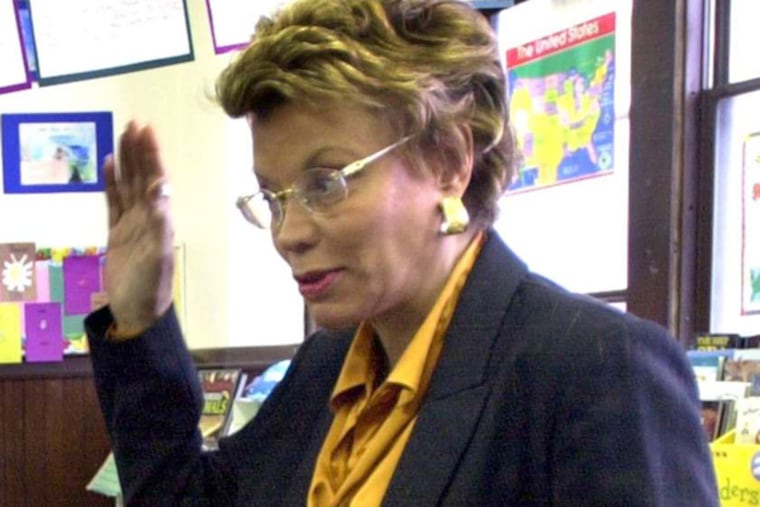Federal jury acquits Brown on 6 counts, deadlocks on 54
After seven days of deliberations, jurors in the federal fraud trial of charter school founder Dorothy June Brown acquitted the veteran educator on six counts late Thursday and said they were here hopelessly deadlocked on the remaining 54.

After seven days of deliberations, jurors in the federal fraud trial of charter school founder Dorothy June Brown acquitted the veteran educator on six counts late Thursday and said they were here hopelessly deadlocked on the remaining 54.
U.S. District Judge R. Barclay Surrick accepted the partial verdict, thanked jurors for their service over the last two months, and discharged them.
Assistant U.S. Attorney Joan Burnes said the government planned to retry Brown, 76, on the counts on which jurors were deadlocked.
"We accept the jury's verdict, but we look forward to the retrial," she said.
Brown declined to comment.
William M. McSwain, one of Brown's lawyers, said: "We're certainly encouraged that the jury did not find Dr. Brown guilty of anything. If we have to retry it, we will. We certainly believe in Dr. Brown's innocence."
The U.S. Attorney's Office has pursued six fraud cases against city charter-school officials since 2005, but this was the first to go trial. The other cases ended with guilty pleas.
During five weeks of testimony, jurors heard accounts of phantom board members, and fabricated documents and forged signatures on contracts that benefited Brown or her management firms. A former counselor testified that she had forged the signature of her own late aunt on such a contract.
Jurors interviewed afterward said the panel was deadlocked, 9-3, in favor of convicting Brown on charges that she defrauded the four charter schools she had founded of $6.5 million and then engaged in a conspiracy to obstruct justice to cover it up.
"I thought the prosecutors did a phenomenal job," said Christine Dick, 55, a real estate agent from Malvern.
She said she wished some jurors had been able to look at the evidence more "objectively." Dick said three jurors seemed to have made up their minds before deliberations began. She said they stated at the outset that they had doubts about the evidence and never wavered.
Other jurors used words such as frustrated and embarrassed to describe their reaction to the impasse.
Earlier in the day, the jury foreman sent a note to Surrick saying that the panel would not be able to reach a unanimous verdict on all charges.
"Emotions are high," he wrote. "Tears have been shed, and some jurors have experienced sickness."
The foreman later told the judge that jurors did not believe they ever would be able to reach agreement.
When polled by Surrick, every juror agreed that continuing to deliberate would be fruitless.
When it was Dick's turn, she said: "Sadly, your honor, I agree."
The panel of nine women and three men women included two African American men and three African American women. The other jurors were white. One of African American men and two of the African American women maintained that they had reasonable doubts about the government's case, panel members said.
Two of Brown's codefendants - Michael A. Slade Jr. and Courteney L. Knight - were acquitted of conspiracy and obstruction of justice charges in connection with an alleged cover-up of the frauds on Dec. 19.
Jurors said they had decided to deal first with the charges against Knight and Slade, whose grandmother is Brown's sister, because they were making no progress on the counts against Brown.
The panel acquitted Brown of four counts of wire fraud related to a $205,000 state grant awarded to the Agora Cyber Charter School, as well as one count of obstruction of justice and one count of witness tampering.
Two other former administrators had pleaded guilty and testified against Brown during the trial. They are awaiting sentencing.
Brown founded three elementary charter schools in Philadelphia that have been academic successes: Laboratory, which has campuses in Northern Liberties, Overbrook, and Wynnefield; Ad Prima, with campuses in Overbrook and Frankford; and Planet Abacus, in Tacony.
She also helped found Agora in 2005 but cut her ties with the charter four years later as part of a settlement involving several civil suits, including one with the state Department of Education.